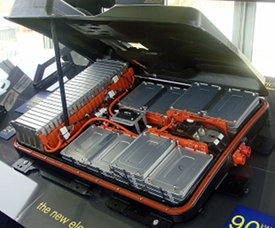Just under a month ago, we reported a few cases in which owners of 2011 Nissan Leafs had noticed the first of twelve lights on their car’s battery capacity gauge had switched off, indicating a marked deterioration in battery capacity after just one year.
Now Nissan has released an official statement about cases in which it affirms its belief that the Leaf’s 24-kilowatt hour battery pack will have a long and useful life.
In short it says, there is nothing to worry about.
Lost capacity
A twelve-bar gauge to the right of the battery charge indicator, the battery capacity gauge is designed to give an at-a-glance indication of battery capacity and health.
As time passes and the battery ages, its ability to hold charge diminishes, meaning each full charge results in a slightly reduced range compared to when the car was new.
With time, the capacity gauge slowly drops, representing that drop in capacity.
When we originally reported the story, the affected cars -- all in Arizona -- experienced the loss of the first battery capacity gauge between 13,633 miles and 17,000 miles.
“A few cases”
Since then, other owners have stepped forward reporting the same issue, but Nissan says it is still only a few owners.
“We’re aware of a few isolated cases where a very small number of consumers are reporting a one bar loss. (We’re talking less than 5 units versus the 12,000 on the road in the U.S.),” a Nissan representative told us.

Arizona
Non linear loss.
In our original article, we told you that the Nissan Leaf workshop manual indicates the extinguishing of the first capacity light represents a 15 percent drop in battery capacity.
Losing that much capacity in the first year seemed drastic in the light of Nissan’s previous statements on battery life, but Nissan says battery capacity loss isn’t linear.
“In general, all batteries exhibit a higher loss of capacity early in life, but then the curve flattens over time,” we were told. “Our internal results indicate that the battery will have 80 precent of its capacity under normal use after 5 years, and 70 percent after 10 years.”
It’s complicated
Lithium-ion battery pack of 2011 Nissan Leaf, showing cells assembled into modules
While we’re glad to see Nissan remains confident in the battery technology found in its Leaf electric car, we’re sure that those customers who have already experienced a loss are anxious to see what happens next.
What will happen? We’re not sure, but for now, Nissan’s official line is non-committal.
“We can confirm that the state of charge[sic] is depicted as a non-linear scale but are not able to confirm the specific totals that each ‘bar’ represents,” Nissan’s official statement says. “Battery life is contingent upon many variables related to driving habits and conditions. We are confident that if owners care for their vehicles properly, they will experience many years of enjoyable driving!”
Your thoughts?
For now, Nissan is not concerned about the battery capacity losses that have occurred so far in a small proportion of Leaf cars in the U.S. They are, it says, still within normal expectations.
But what do you think? Is Nissan’s explanation enough, or have the examples in Arizona made you wary of buying its electric car?
Let us know in the Comments below.
+++++++++++













